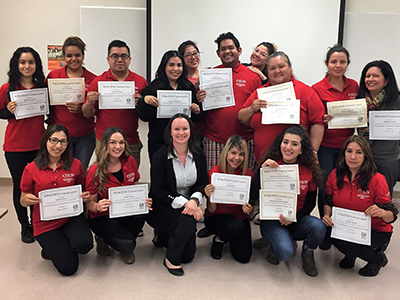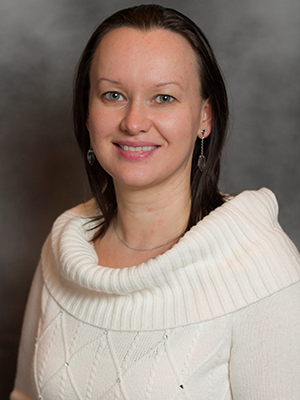
CSUN VITA Clinic students provide interpretation to help Spanish-speaking clients.
Trying to do your taxes by yourself, without proper guidance, can be hard. Trying to do it in a different language can be nearly impossible. That is why, with the generous support of Bank of Hope, the Spanish Interpretation Program, in coalition with the VITA Clinic, has helped thousands of non-native English speakers fle their tax returns.
First started in Spring 2016, the Spanish Interpretation Program, then run as a service learning project in the Spanish Linguistics course, grew and became available to all CSUN students who had an interest in being an interpreter.
Dr. Svetlana Tyutina, graduate program director, who designed and frst started the project in Spring 2016, understood how important this service would be to the local community.

Dr. Svetlana V. Tyutina,
associate professor of
Modern
and Classical
Languages and Literatures
“For many of the clients (some of whom are also CSUN students and members of their family) it is an opportunity to receive cost-free services,” said Tyutina. “This program is essential to the community and an opportunity to help non-English speakers.”
Volunteers are made up of CSUN students who wish to volunteer their services as interpreters. All volunteers begin by applying for the position. Once volunteers have demonstrated their language skills (English/Spanish), they must pass a series of certifications and courses before they can start.
Volunteers also have the opportunity to receive university credit for their services, and, after reaching a certain number of hours on the job, can even apply for a paid position as an interpreter.
There is a certain mindset that Tyutina instills in her interpreters that makes this more than just a job.
“I make sure that my interpreters understand to keep an open mind and to be acutely aware of the cultural, linguistic and personal differences there may be with the clients,” said Tyutina. “Our interpreters make sure to be inclusive and sensitive to the social issues apparent to the clients.”
Though the Spanish Interpretation Program helped many local community members and students with their services, the growing concern of COVID-19 mandated its shut down in mid-March. Tyutina stressed the importance of this program and its growing need.
“Every year the program gets larger and larger. We need more interpreters to volunteer their services to meet the current demands,” said Tyutina.
Not only is this program a great opportunity for local community members and students alike, it also gives volunteers an opportunity to connect to the community and feel a sense of accomplishment for the services they provided. Some students even find their careers, moving on to pursue business translating positions or to present related research projects at regional and national events.

